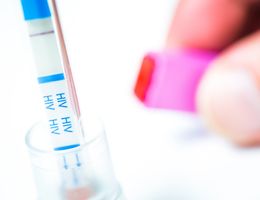Health library
Back to health librarySex and HIV: Protect yourself

Sex with an infected person is one of the most common ways people contract HIV.
About 1.2 million Americans may have HIV (the virus that causes AIDS), according to the Centers for Disease Control and Prevention (CDC). Nearly 13% of these people are undiagnosed, according to CDC. That number is especially concerning considering that unprotected sex with an infected person is one of the most common ways people get HIV.
HIV can be in a person's blood, semen or vaginal secretions and can enter a partner's body through tiny cuts or sores in the skin or through mucous membranes, including mucous membranes in the vagina, penis, rectum or mouth.
Lower your risk
According to CDC, the only way to be completely protected from the sexual transmission of HIV is to abstain from sex or to have sex only with a mutually monogamous partner who you know has been tested and is not infected.
There are several ways to lower your risk, however. Here's some advice from CDC, the American Academy of Family Physicians and the American Sexual Health Association:
- Use a condom every time you have sex.
- Ask your partner about his or her HIV status and whether he or she has had a recent HIV test. Remember, you can't tell whether your partner is infected just by looking at him or her. The only way to know for sure is to be tested.
- Ask your partner if he or she has been tested for other sexually transmitted infections (STIs), such as gonorrhea or syphilis. People who have another STI may be more vulnerable to HIV infection.
- Do not do anything more intimate than kiss until both you and your partner have had HIV tests.
- Don't inject drugs-and especially don't share needles, syringes or other equipment. Germs from an infected person can stay in a needle and then be injected into the next person who uses the needle. Many people have been infected with HIV this way.
- Only have one sex partner. The more sex partners you have, the greater your chances of getting HIV.
Using a condom correctly
It's important to use condoms properly and consistently. Incorrect use can cause condoms to slip or break, reducing their protective effect.
When opening a condom wrapper, don't use your fingernails or teeth. The condom inside can tear. If you do accidentally tear a condom while opening the wrapper, throw that condom away and get a new one.
Put the condom on before there is any contact with your partner's genitals or mouth. Hold the condom by the tip to squeeze out the air, leaving some space at the tip. Unroll the condom all the way over the erect penis.
If you use a lubricant with latex condoms, use one that is water-based. Never use lotions, baby oil, petroleum jelly or cold cream; the oil in these products quickly weakens condoms and can cause them to break.
After sex, hold the condom in place at the base of the penis and pull out slowly while the penis is still erect. Use a new condom for every sexual act.
Learn more
For more information about HIV/AIDS and other STIs, visit the following websites:
- CDC's National Prevention Information Network.
- American Sexual Health Association.
- National Institute of Allergy and Infectious Diseases.
Reviewed 6/17/2025
